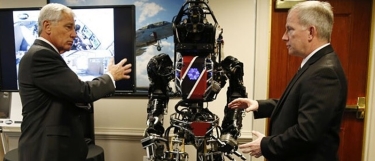
Imagine a time when we can communicate with machines not by pressing buttons, but simply by thinking. That time may come soon through the efforts being undertaken by the U.S. Department of Defense.
In a statement, the Defense Advanced Research Projects Agency (DARPA)—the Pentagon's research arm responsible for exploring emerging technologies for military use—announced that it is developing an advanced implant that would allow the human brain to communicate directly with computers.
DARPA's program manager, Phillip Alvelda, explained that the goal of the new device his agency is developing is to "open the channel between the human brain and modern electronics."
To be able to do this, the implantable device will be developed so that it will be able to convert nerve cells or neurons in the brain into electronic signals. If the agency is able to do this, DARPA can boast of unprecedented "data-transfer bandwidth between the human brain and the digital world."
Alvelda further said the proposed implant will be very small, approximately just one cubic centimetre, or roughly the size of two stacked nickels.
Although very tiny, DARPA envisions the implant to result in huge accomplishments, especially in terms of aiding individuals with aural and visual disabilities, such as retired soldiers who were injured in combat.
The agency also aims to use the implant for new therapies to help people with sight and hearing deficiencies by "feeding digital auditory or visual information into the brain."
In an interview with CNN, Conor Walsh, who teaches mechanical and biomedical engineering at the Harvard University, said the implant being developed by DARPA would "change the game."
"In the future, wearable robotic devices will be controlled by implants," Walsh said.
Steven Pinker, a cognitive scientist and professor of psychology at Harvard, on the other hand, was not convinced of DARPA's plan, even describing it as "bunch of hype with no results."
"We have little to no idea how exactly the brain codes complex information," Pinker said in a separate CNN interview.
















